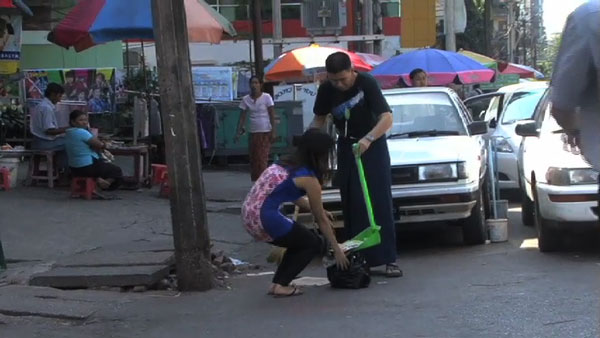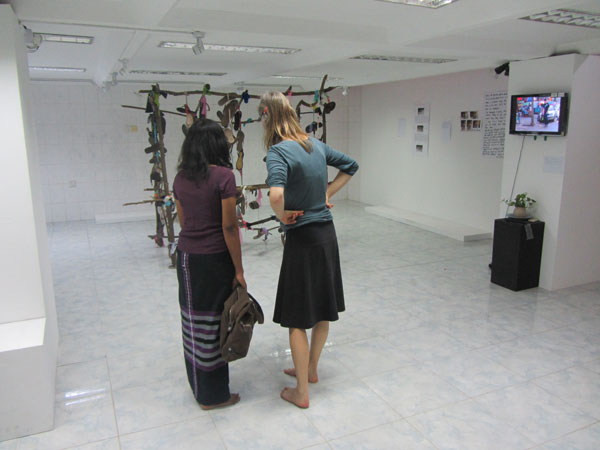METHODS TO RE-EVALUATE EVERYDAY ACTIONS (2013)
Workshop in co-operation with Daniel Segerberg and artists related to New Zero Art Space in Yangon, Burma/Myanmar
I wanted my participants to reflect upon our social norms. What do we do everyday without reflecting? Are we satisfied with that, or is it just a norm? Can we/do we want to do it in another way? Every day we practiced one or two of these ”protests”, all together or one by one.
Some of the actions during the workshop:
Cleaning Act
Myanmar people finding the streets of Yangon dirty. Myanmar people just waiting for something to happen. Instead of waiting, six Myanmar people and one Swede thought, “Let´s do it ourselves. WE start to clean streets and make them into ours”. But as a relay race, since a group of people cleaning the streets can be seen as a demonstration, and that is illegal.

Excerpt from video documentation Cleaning act
Walking backwards at Bogyoke Market
Six Myanmar people and one Swede want to go backwards through the traditional Bogyoke Market. The Myanmar government do not do any difference between art performance and demonstration. More than five people are not allowed to be gathered.
Six Myanmar people and one Swede change the performance into a repetition act. Planning: one at a time walks backwards through the market and then disappears.
At the Bogyoke Market: Six Myanmar people and one Swede waiting to start. Six Myanmar people told not to do it. Too dangerous. Swede saying, ok, then just I do it.
Swede going backwards through tailor corridor, all the way up to main passage. Still backwards turning around the corner, continuing through next corridor. People looking, starring, pointing, smiling, some angry faces, some confused faces.
Swede continuing back to starting point. Six Myanmar people gone. Swede confused. Waiting. Two of the six Myanmar people coming, picking her up. ”Come quickly: Police was here! Police telling not allowed going backwards through Bogyote Market”.
Individual initiatives
One Myanmar person does not like to eat in restaurants facing other unknown people. This evening Myanmar person turned around while eating.
One Myanmar person stayed in line waiting for the bus. Bus came. All people went on, except this Myanmar person, just standing still. Waited and took the next buss.
One Myanmar person went to the bakery buying bread (Myanmar people usually do not eat bread). This day he went even twice. This Myanmar person never speaks to shopkeeper. Today shopkeeper asking, why do you buy bread instead of rice? A conversation was started.
Parents of one Myanmar person always telling her to hurry up, “you are too slow”. This day Myanmar person changed position with her parents, commanded them to hurry up, “you must be quicker”.
